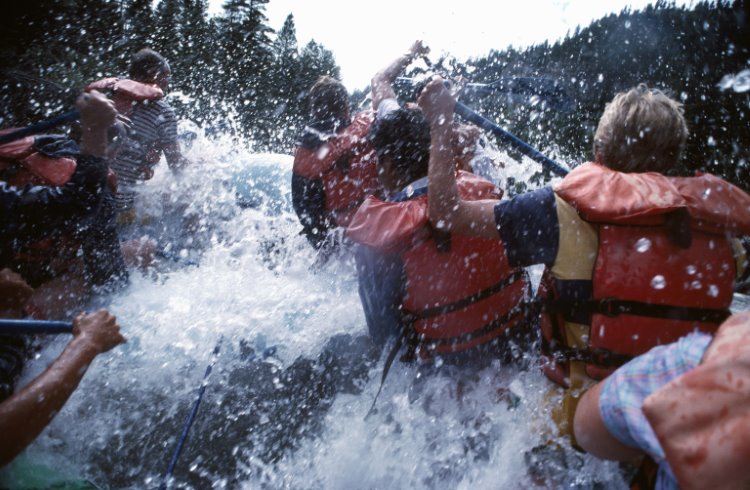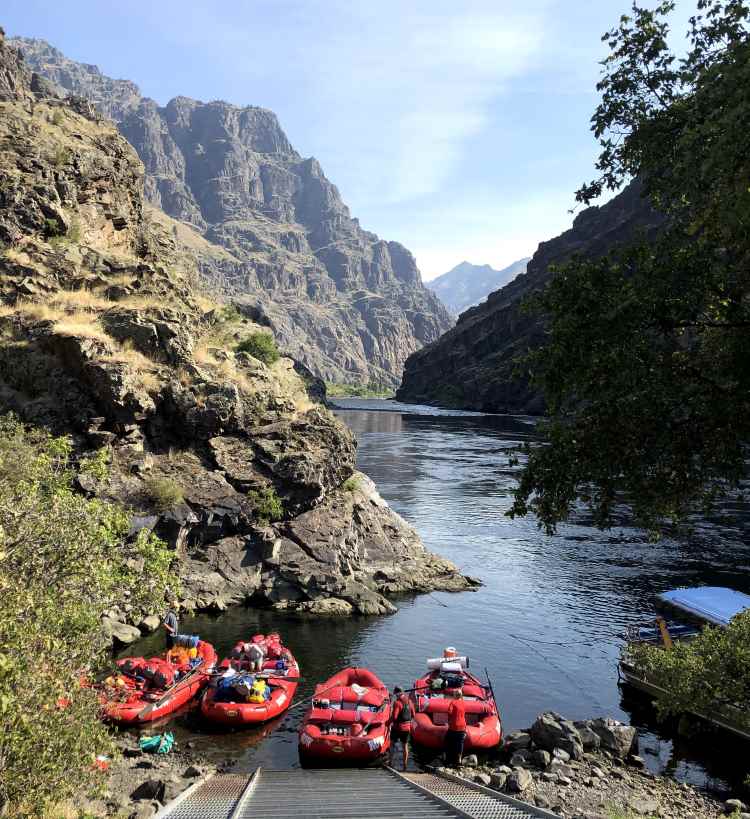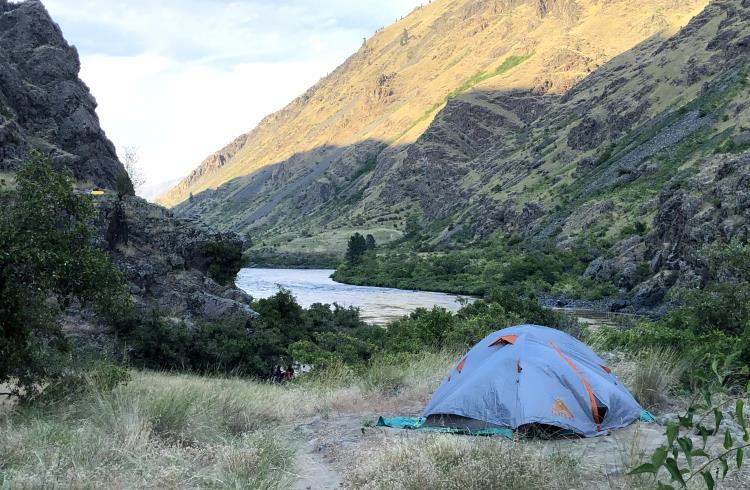Can I Still Go On a Rafting Trip During COVID-19?
Is it safe to go on a multi-day whitewater rafting trip with strangers right now? Nomad Ellen shares her experience.
 Photo © Getty Images / Jeff Foott
Photo © Getty Images / Jeff Foott
- New coronavirus safety protocols for rafting
- Social distancing on the river
- Why our pandemic rafting trip is totally worth it
- What to know about rafting during COVID-19
- What World Nomads says about rafting during COVID-19
Like a lot of travelers, my travel plans for this year did not turn out as expected. Instead of three weeks exploring the Himalayas in Ladakh, India, my husband and I were facing month five of sheltering in place in California. We needed to escape, but also stay safe. Our solution: a multi-day rafting trip on the Snake River in Idaho, in the northwestern United States. We’d be running rapids ranging from Class I to Class IV, enjoying the beauty of a spectacular canyon, spending our days in the open air, and sleeping under the stars.
We’d also be with a group of strangers gathered from all over the COVID-19-riddled USA.
New coronavirus safety protocols for rafting
Our first thought is: how safe will we be packed into small boats at close quarters with others, as well as eating and camping together?
Let's be clear – it's not possible for an outfitter to guarantee that none of the guests will get coronavirus. But the company we travel with, ROW Adventures, has implemeted a number of new safety measures to protect its guests and staff. These were put together in collaboration with some other outfitting groups ROW belongs to, such as the Idaho Outfitters & Guides Association and the Wild Rogue Outfitters Association.
The protocols include limiting the number of people in each boat (and keeping travel parties to their own boat where possible), eliminating buffet service at meals, and requiring guides to wear masks when preparing and serving food. Instead of tents being set up by the staff at each campsite, we are assigned our own tents and tables/chairs for the duration of the trip, which we have to set up and take down each day. This actually has an advantage – we are able to choose our own spot to camp each night.
The night before the trip, we attend an orientation at our hotel in Cambridge, Idaho, and meet the rest of the group – a family of four from Seattle, another from Fort Lauderdale, Florida, and two life-long friends from Louisville, Kentucky. Our trip leader, Connie, is affectionately known as “The Queen of the Snake.” Petite but formidable, she’s been rafting this river for more than 30 years.
We’d all previously agreed to ROW’s Code of Conduct regarding COVID-safe behaviors. Now, we fill out a health form confirming we don’t have symptoms of COVID-19 and haven’t been exposed, and have our temperatures taken. If we have fevers or are unable confirm the health questions, we will not be allowed on the trip.
Our temperatures are taken again on the third night. If any of us displays positive symptoms during the trip, that person would be isloated from the others for the rest of the journey. But that's not an issue on our trip.

Social distancing on the river
Maintaining six feet of distance from other passengers on a river raft is not always easy. Our trip uses two types of sturdy, inflatable rafts – one paddle boat, and four cargo boats. In the paddle boat, which is smaller and lighter, the passengers sit on the edges of the boat so they can help paddle, and the guide sits at the back, steering with two oars. In the cargo boats, which are larger, heavier, and more stable, the guide sits in the middle, manning the oars, and passengers can ride up front or at the back (paddling not required).
The paddle boats hold four to six passengers, as well as the guide, and quarters are fairly tight. The two families are comfortable sharing the paddle boat with other members of the group. My husband and I are not, so we ride in one of the cargo boats, safely distancing ourselves from others. The cargo boats have to take a somewhat more conservative line through the rapids, but it’s still plenty exciting, especially on the three Class IVs.

At camp and during meals, we keep our tables and chairs spaced apart. But we find it almost impossible to keep our distance at all times. Take water rescues, for example. If you go for a “swim” in fast-moving water, either on purpose or by accident, you may need to be hauled back into the raft. If properly executed, the rescuee ends up lying more or less on top of the rescuer – rather awkward in any circumstances. On one occasion, after bobbing my way through a “swimmable” rapid (on purpose), I have to be quickly hauled in because a jet boat is approaching.
There are also times when the sheer magic of the trip makes us forget all about COVID-19 – like when I unthinkingly hand my binoculars to one of the guests, so she can get a closer look at a black bear on the hillside above our camp.
But, because we are in the open air the entire time, we feel the risks are pretty low. It’s one of the reasons we all chose this type of adventure in the first place.
Why our pandemic rafting trip is totally worth it
The COVID-19 precautions add some minor complications to the trip – but they can’t take away the thrill of bucking and plunging down a big Class IV rapid, or navigating a Class II or III in an inflatable kayak. They can’t take away the grandeur of the canyon soaring above us, or the excitement of spotting families of bighorn sheep and mountain goats up on the bluffs. They can’t take away the hours of sitting on the riverbank on the warm summer evenings, telling jokes and riddles.
The guides are wonderful – highly competent, attentive, and entertaining. The food is gourmet quality. And the mental health benefits of five days off the grid, focused on challenges I can actually see and deal with, instead of the looming, unseen risks of the pandemic, can’t be overstated.
It isn’t Ladakh, but it’s exactly what I need.
What to know about rafting during COVID-19
While it’s not possible to elimate the risks of catching the virus entirely, a lot depends on how closely the guests follow the regulations. Here are some things to keep in mind:
- When deciding on a trip, first check to see if the company addresses COVID-19 on their website. If they do not, reconsider traveling with them.
- When planning your trip with the outfitter, be honest and specific about your needs and risk tolerance. If you have concerns about social distancing, say so. If you are keen to paddle (or would rather not), speak up. Don’t wait until the orientation to do so – once the group is at the river, it may not be easy or even possible to accommodate new demands.
- Be sure to maintain as much distance as possible on buses or other transit vehicles when traveling to and from the river, and keep windows open for proper ventilation. Face masks should be worn by all passengers and the driver – if that rule is not being followed, don’t be afraid to say something to the trip leader.
- Safety measures at the hotels at the beginning and end of the trip may be out of the operator’s control, especially if there are no face mask mandates in those towns/states. Bring sanitary wipes to wipe down high-touch surfaces, carry plenty of hand sanitizer, and consider bringing your own pillows and pillowcases.
- Not all guests will have the same level of concern about COVID-19. Set a good example by wearing your mask and keeping your distance when appropriate, washing hands well before meals, and refraining from handshakes and hugs. It shouldn’t keep you from bonding and having a great time – it didn’t prevent us from doing so.
What World Nomads says about rafting during COVID-19
World Nomads has not declared rafting safe from COVID-19. Nobody knows if the world will ever be “safe” from coronavirus again, unfortunately, so it’s up to each of us to take responsibility for our own protection.
Related articles
Simple and flexible travel insurance
You can buy at home or while traveling, and claim online from anywhere in the world. With 150+ adventure activities covered and 24/7 emergency assistance.
Get a quote

No Comments